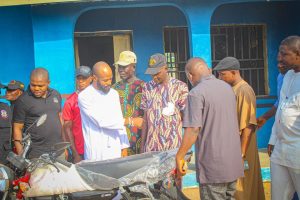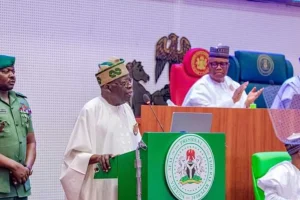A new report by the Kimpact Development Initiative has revealed significant concerns about the role of money, particularly “dark money,” in shaping the outcomes of the 2024 governorship elections in Nigeria’s Edo and Ondo states.
The Kimpact Development Initiative’s ‘Edo and Ondo Governorship Elections Political and Campaign Finance Tracking Report’ highlights a surge in campaign expenditure, coupled with weak and inconsistent enforcement of political finance regulations. The study by the initiative points to a growing “financialisation” of electoral competition in Nigeria.
One of the key findings of the Kimpact Development Initiative report is the pervasive presence of opaque funding in political campaigns. The report states that political parties and candidates often operate with unclear financial structures, making it difficult to trace spending back to declared income sources. This lack of transparency has allowed unregistered political groups and other third-party actors to fund election activities outside the formal regulatory framework.
This practice is a violation of Nigeria’s constitution, which prohibits organisations other than political parties from making political contributions. However, the Kimpact Development Initiative’s findings indicate that unregulated third-party spending persists, creating loopholes that allow external influences to impact election results.
Strategic Differences in Campaign Spending
The Kimpact Development Initiative report also identified different campaign spending strategies in the two states. In Edo, political parties focused on large-scale ground mobilisation alongside significant investment in media campaigns. Campaign rallies accounted for the largest share of spending in the state, estimated at 3.17 billion naira.
In contrast, the Ondo election saw a more localised approach, with parties spending considerably less on large rallies (around 461 million naira) and relying more on banners, posters, and billboards for voter outreach. Interestingly, the Labour Party (LP) in Edo allocated 1.6 billion naira to media campaigns, prioritising airwave visibility over direct grassroots engagement, while having a minimal financial presence in Ondo.
Election Day Spending and Vote Buying
A particularly worrying trend highlighted in the Kimpact Development Initiative report was a spike in spending on election day itself, which in some cases exceeded the total amount spent throughout the entire campaign period. This suggests that financial influence is at its peak during the voting process, reinforcing concerns about vote buying and electoral manipulation.
Evidence indicates that some candidates relied heavily on last-minute financial mobilisation to secure votes, rather than sustained engagement with voters. While early investment in voter persuasion was observed in Edo, the final results suggested that money alone was not enough to guarantee victory. In Ondo, however, a late surge in spending on election day appeared to have played a decisive role, suggesting that direct financial inducements to voters significantly influenced the outcome.
The Kimpact Development Initiative estimates that substantial sums of money were allocated to securing voter loyalty through financial incentives in both states. It also notes a dramatic increase in campaign costs over the past 12 years, with spending in Edo rising by 1,923% and in Ondo by 369%. This surge raises concerns about financial barriers to political participation, making elections increasingly inaccessible to candidates without significant financial backing.
Cost Per Vote Analysis
An analysis by the Kimpact Development Initiative of the Cost Per Vote Share (CPV) revealed that the Labour Party in Edo had the highest CPV, suggesting an expensive but inefficient electoral strategy. In contrast, the All Progressives Congress (APC) in Ondo demonstrated the lowest CPV, indicating a more cost-effective use of campaign funds. The People’s Democratic Party (PDP) struggled in both states, with significant spending but low vote conversion rates.
Historical data suggests that while higher spending often correlates with electoral success in Nigeria, it is not the sole determinant. Regression analysis conducted by the Kimpact Development Initiative indicated that campaign finance accounts for approximately 53% of electoral outcomes, with other factors such as party structure, candidate appeal, incumbency, and local dynamics determining the remaining 47%.
Recommendations for Reform
The Kimpact Development Initiative report concludes that the 2024 elections in Edo and Ondo underscore the entrenched role of financial resources in Nigerian politics and highlight deep structural issues within the country’s political finance framework. It calls for stronger regulatory enforcement, real-time financial disclosures, and mechanisms to curb vote buying to ensure that electoral outcomes are shaped by democratic choice rather than wealth.
The report by the Kimpact Development Initiative makes several recommendations for stakeholders:
- Independent National Electoral Commission (INEC): Move towards real-time campaign finance disclosure, strengthen monitoring and enforcement, establish a dedicated unit to investigate opaque funding, and mandate media disclosure of political advertising costs.
- National Assembly: Replace arbitrary spending limits with a scientific methodology linked to voter population, amend the Electoral Act to prohibit corporate donations, and require proof of tax compliance for high-value donors.
- Political Parties and Candidates: Improve internal financial accountability, adopt grassroots fundraising models, and use digital finance tracking tools.
- Civil Society Organizations and Election Observers: Strengthen independent financial monitoring, advocate for stricter reporting timelines, and intensify public awareness campaigns against vote buying.
- Media: Play a more investigative role in exposing hidden financial networks, train journalists in political finance reporting, and advocate for transparency laws on political advertising.





Add Comment